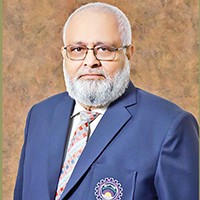
Dr. Sarosh Hashmat Lodi
Biography
Dr. Sarosh Hashmat Lodi is working as the Vice-Chancellor NED University of Engineering & Technology, since March 2017. Prior to joining as Vice-Chancellor, he served NED as Dean, Faculty of Civil Engineering and Architecture since 2010. Also serve as Chairman, Department of Civil Engineering from 2003 till 2010.
He had the honor to be the first Management Representative for ISO 9000 from 1998 till 2005 and developed a Quality Assurance System for higher education. Through this Quality Assurance System, NED University became the first public sector university in Pakistan to acquire ISO 9000 – 2000 certification in 2002. This system is being used as a benchmark by the Higher Education Commission for all universities in Pakistan now.
He had graduated with Bachelor of Engineering (Civil) degree in 1985 and obtained Master’s degree in Structural Engineering from Oregon State University, USA in 1988. He had honor to won Central Overseas Scholarship in 1994 to pursue Ph.D. in UK and was awarded Ph.D. in 1998 by Herriot- Watt University, UK in structural Engineering.
In 2005 he was selected by the University to undergo administrative training at Pakistan Administrative Staff College Lahore and successfully completed 82nd National Management Course. He was awarded the best University Teacher award in 2002 by the Higher Education Commission and overseas Research Student Award by the Committee of Vice-Chancellors and Principals, UK for the years 1995 till 1997.
Dr. Lodi’s research work is well published in peer reviewed international journals, presented in numerous national and international conferences, so far his around 100 Research Papers have been published, in addition to have co-authored a book on Earthquake, his research contribution was acknowledged by the University and awarded Research Excellence Award by NED University Syndicate and Gold Medal by the NED University Teachers’ Association in November 2016.
He is amongst the pioneer in developing student exchange programmes for NED University students funded by European Union and examples of Erasmus Mundus Mobility with Asia – EMMA in 2008 and Eurasian University Network for the International Cooperation on Environmental Risks in 2010.
He also served as elected member of Governing Body of Pakistan Engineering Council for two consecutive terms and elected member of the Central Council of the Institution of Engineers, Pakistan. In recognition of his contribution, he was awarded fellowship of Institution of Engineering Pakistan in 2015. In March 2019 Presidential Award for Pride of Performance was conferred to Dr. Sarosh Hashmat Lodi to recognize his services in field of Education, particularly in field of Civil Engineering.
Abstract
Modernising Engineering Education in Pakistan
Engineers play a very important role in the development of a country. They provide the foundation for development by contributing to various sectors. From infrastructure to manufacturing, science and technology, sustainable development, and innovation – engineers contribute in all these areas. All the developed countries of the world rely heavily on their engineering sector.
Quality higher education is required to produce graduate engineers who can effectively play these vital roles. The higher education institutions offer various degree programmes in all major fields of engineering in Pakistan. Traditionally, higher education has been provided by public sector institutions in the country; however, the contribution of private sector institutions has been growing recently. Higher Education Commission of Pakistan (HEC) regulates the higher education sector in the country and Pakistan Engineering Council (PEC) regulates the engineering profession. Apart from funding and regulating the HEIs, HEC also develops standardised curriculum for various programmes through its National Curriculum Revision Committees. For engineering programs, PEC has adopted HEC curricula. Recently, PEC has become full signatory of the Washington Accord and incorporated outcome based education (OBE) system for engineering education in Pakistan.
This paper presents the overview of current state of engineering education in Pakistan. The need for modernizing engineering education is established in the light of major shifts in the last 100 years. These shifts focus on science and analysis, learning outcomes, emphasis on engineering design, applying education, learning and social-behavioural science research and integrating information, computational and communication technologies. Moreover, with adoption of OBE, rapid technological advancements in teaching and learning methodologies, advanced pedagogies and future requirements of engineering sector in the country keeping pace with technology, recommendations on modernizing engineering education in Pakistan are outlined. A road map for implementing the policy guidelines is also presented.
